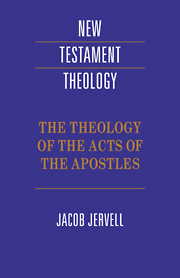2 - Purpose and historical setting
Published online by Cambridge University Press: 05 June 2012
Summary
We have a series of different theories about Luke's purpose in writing Acts:
A defence for Paul in his trial.
Luke wants to gain the advantages of the status of religio licita for the church or to present political apologetic.
Luke wants to clear away misconceptions for Jewish Christians about Paul.
A defence of Paul's memory and his preaching.
A defence against Gnosticism and docetism.
A confirmation of the gospel.
Evangelism.
Acts demonstrates the trustworthiness of the proclamation of Christ.
The promises in the Scriptures and of Jesus are fulfilled in the church.
Luke wants to write the last book of the Bible or continue the biblical history.
Acts gives a Heilsgeschichte for the third generation of Christians.
Very often the purpose has been seen in connection with the presentation of Paul. This is legitimate since from Acts 9 onwards Paul is the central figure and seventeen chapters are devoted to him. Three issues must be taken into account in considering Luke's purpose: (1.) the strong Jewish character of Acts; (2.) the interpretation of the Scriptures, and (3.) the position of the law-observant apostle and missionary to the Jews, Paul. The Jewish life of the churches is described in a way that shows it to be self-evident for the readers; the same is true for the interpretation of the Scriptures, whose authority is taken for granted. Far more difficult is the presentation of Paul. Other figures of the church are seen as well known to the readers – Peter, the Twelve, James the brother of the Lord, Barnabas etc., – whereas Luke presents Paul in every detail and his life apologetically, as if he were previously unknown to his readers, but in a way acceptable to them.
- Type
- Chapter
- Information
- The Theology of the Acts of the Apostles , pp. 11 - 17Publisher: Cambridge University PressPrint publication year: 1996



